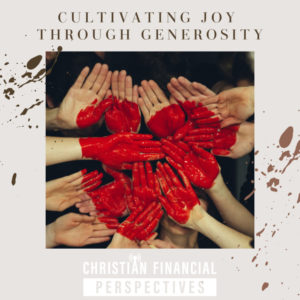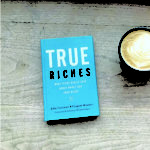Click below to listen to Episode 65 – Cultivating Joy Through Generosity
Subscribe: Apple Podcasts | Google Podcasts | Spotify | Amazon Music | Stitcher | RSS | More
Cultivating Joy Through Generosity
Do you have the desire and courage to be a generous giver? In this episode, we look at various ways to financially give to those causes closest to us. The Bible teaches us to pursue a life that imitates Jesus, and what better way than by being a generous giver?
As Christian financial advisors, sometimes we feel that we spend our days helping people accumulate more and more wealth. However, at times, it’s hard not to wonder what the ultimate purpose of that money is. Once we have answered the question “How much is enough” and have planned for future financial needs, then what?
HOSTED BY: Bob Barber, CWS®, CKA® and Mary Jo Lyons, CFP®, CKA®
Mentioned In This Episode
Want to ask a question about your specific situation? Schedule a complimentary 15 minute phone call.
EPISODE TRANSCRIPT
[INTRODUCTION]
Bob: Welcome to Christian Financial Perspectives, a weekly podcast where we talk about ways to integrate your faith with your finances. This is Bob Barber.
Mary Jo: And I’m Mary Jo Lyons.
Bob: Are you ready to learn how to apply biblical wisdom to everyday financial decisions?
Mary Jo: Join us as we look at integrating your faith with your finances. If it’s your first time listening, welcome to our podcast, and if you’re a returning listener, welcome back.
[EPISODE]
Bob: For today’s podcast, our scripture comes from Deuteronomy 8:11-18, “But that is the time to be careful. Beware that in your plenty you do not forget the Lord your God and disobey his commands, regulations, and decrees that I’m giving you today. For when you become full and prosperous and have built fine homes to live in and when your flocks and herds have become very large and your silver and gold have multiplied along with everything else, be careful. Do not become proud at that time and forget the Lord your God who rescued you from slavery in the land of Egypt. Do not forget that he led you through the great and terrifying wilderness with this poisonous snakes and scorpions, where it was so hot and dry. He gave you water from the rock. He fed you with manna in the wilderness, a food unknown to your ancestors. He did this to humble you and test you for your own good. He did all this so you would never say to yourself, ‘I have achieved this wealth with my own strength and energy.’ Remember the Lord your God. He is the one that gives you the power to be successful in order to fulfill the covenant he confirmed to your ancestors with an oath.”
Mary Jo: Wow. Bob, that was a long one, but I know it really spoke to you since you just recently stepped on that scorpion.
Bob: Yeah. That was my first time and I hope that’s my last time cause that really hurt.
Mary Jo: I’m sure it did. When I saw that I had a little bit of a chuckle. And you know, as Christian financial advisors, sometimes we feel that we spend our days helping people accumulate more and more money. But at times, it’s hard not to wonder what the ultimate purpose of that money is. What do you think?
Bob: It seems that way, you know sometimes it’s like the goal is just to create more to buy newer cars and bigger houses and more stuff. And this can definitely be a dangerous perspective of money. And you’ve heard us say that many times here on Christian Financial Perspectives. The Bible has so much to say about money and our possessions and our attitude about how to handle it. So the point of today’s message is not for us to pursue riches in order to create this ultimate abundant lifestyle, but to take the Bible because the Bible teaches us to pursue a life that imitates Jesus’s ways and strengthens our relationship with God. This relationship with God, results in gratitude, contentment, trust, and hopefully, above all, generosity. I think that Jesus teaches more about our relationship with money and our character, and he fuels our spirit more than it teaches us about the attainment of it just for money’s sake, if that makes sense.
Mary Jo: It does, Bob. I just want to ask our listeners, do you have the desire and the courage to be a generous giver? Today, we are going to look at some ways to pursue significance in generosity for kingdom purposes. And you know, Bob, I was reading a book recently. The author explored the concept of how much is enough, and we’ve asked that same question many times on the podcast. Do you have a specific number that would make you content? Is there a point you could achieve that you would be happy? A house that would be big enough that you wouldn’t want an even bigger, more palatial estate? A car that you would be content to drive without wanting one that was even flashier or more impressive?
Bob: Okay, Mary Jo, as you say these questions, you talked about the estate. You know how I love land?
Mary Jo: I do, Bob. So that’s a question for you. How much is enough, Bob?
Bob: I’m on 17 acres, but I’d like to have about four or 500 more. You know, so that’s a whoo. You hit home here.
Mary Jo: Yes. And that native Texan and you coming out. Bigger is better.
Bob: So could our hearts be calling us to be more generous, but maybe we got our hands so tight that we’re not letting go of it. You know, we got that tight fist and we need to open that up. Most of us struggle greatly with that message of our time and consumerism. The American message is all about accumulating more and more and more stuff. We tend to want that stuff and covet it, but you know what? That stuff is all just going to rust. It’s going to rot. It’s going to decay. By the way, you notice I said we? Cause I’m right there with you and Mary Jo, you’re there too.
Mary Jo: Absolutely.
Bob: It’s a hard habit to break. It’s the American way. Let’s face it. We live in a society where coveting is encouraged. Contentment, though, that’s what we need and we can find contentment. We can find that peace where we are, regardless of what all it looks like around us. But in this culture of consumerism and me, me, me, is that possible? We believe it is. We certainly hope so. Contentment doesn’t have to mean poverty either and depriving ourselves of everything. We’re not saying that, but many Christians do choose to live more simply and I see it every day, which leaves more money available for giving, and that releases that bondage of selfishness.
Mary Jo: You know, Bob, as you are speaking, I kept having these thoughts over and over that consumerism, that “me, me, me,” that accumulating stuff mindset – I do think that some of that changes as we age and we move through our lifespan. You’re younger. Young adults starting to nest and build their first homes. They do tend to get caught up in – and I’m only speaking from experience, you know, that was my experience – we want to buy more stuff because our friends have more stuff. So we want to compete. We want to keep up with the Joneses, if you will. But then, as you get older, not that I’m old, but you start to downsize. We’ve downsized twice now, and you start getting rid of that stuff. So you’re like, why did you need this stuff in the first place? I think that we learn those lessons over time. Less is more.
Bob: That’s the truth. And it reminds me of that scripture where Solomon is talking in Ecclesiastics, and he gets to the end of his life and he finds out so much of this is just meaningless, meaningless, meaningless, trying to accumulate more and more and more.
Mary Jo: So none of us know what the future holds, what we will face in old age, and what the financial implications might be, but we can and should plan so we can prepare. As believers, we also have tremendous faith, but is our faith that God will take care of us enough to let go and open our hands for giving? This is an ultimate question we’re trying to solve, but it’s a hard one. We get it. How much is enough and we don’t know what the future’s going to hold. I was reading another book, “True Riches, What Jesus Really Said About Money and Your Heart” by John Cortines and Gregory Baumer. In the book, I read the following passage, “The most critical decision you will ever make is whether or not to recognize and respond to God’s love for you, joyfully surrendering your life to his leading rather than continually trying to make everything happen on your own. Surrender goes hand in hand with salvation. When you accept the gift of salvation, your whole life comes under the authority and guidance of God, including your money.” Now that gave me pause for thought. The first step is reaching that feeling of gratitude instead of pride for what we have and what we’ve accomplished and accumulated. After all, as followers of God, we’re called to remember who owns it all. He has provided everything for our use and enjoyment, but it’s not really ours. It’s his on loan to us.
Bob: And you know what, Mary Jo, that spits so much in the face of what society teaches us, though.
Mary Jo: That’s right. Once this is done and we realize we have more than enough, we can be at peace that our future is secure and now we can find joy and opening our hands and our hearts for kingdom causes to help those less fortunate. So, what’s next, Bob?
Bob: It’s giving season, isn’t it? We’ve gotten past Thanksgiving and we’re heading into Christmas. I always think of that is the giving season. Let’s assume that you’re ready to jump in now with that joyful heart. So once you’ve answered this question “how much is enough” – that’s a huge question – and have planned for your future financial needs and those of your family, then what? God knows our hearts and he wants to see our actions reflect what’s in it. But sometimes it’s hard to actually do what’s in our hearts and what is telling us. We have that tight fist again that we talked about, and we’re born with that sinful nature. We want it to be all ours and we as human beings, we’re just naturally selfish, but God wants us to adopt his selfless nature. Let me say that again. God wants us to adopt his self less nature. The good we have is God working through us and in us and when we allow God to change us and soften our hearts, there’s nothing we can do about that selfish nature on our own. But with God’s grace we can, and that saving relationship through his son Jesus Christ can help us.
Mary Jo: How can we give more? Giving has changed and so have the vehicle’s forgiving. So what do we do with those extra dollars? When you think about how your giving can be pooled with others, givers just think about how you can influence and support causes across the world, how you can bring others to Christ through your efforts and spread the word of God. So how can you give? One of the easiest and most current ways is to create a donor advised fund. A donor advised fund is a great tool that can help you pull charitable donations from year to year to give in many different ways. You can give smaller amounts as needs arise or causes that you care about come across your radar or you can hold it and accumulate more and give a larger amount down the road.
Bob: And I like it with a donor advised fund too, Mary Jo. You can get your family involved in that. We’ll emphasize to a lot of people when they open a donor advised fund to call it whatever the “[name of your family is] Family Giving Fund”. Donating appreciated assets is another great strategy for giving that we’ve done over the years. So think about do you have a stock that you’ve been holding onto for some time and has got a lot of capital gains in it and you don’t want to sell it, you know, because you’d have taxes. Maybe even inherited it from your grandma or grandpa and couldn’t part with it. So rather than sell it and realize some gains, why not? Think about donating it to your favorite charity or charities. If you have two different stocks, two different companies, you could donate to two different charities and establish that legacy of giving for your grandma on her behalf. You know, it’s a great way to remember them if she’s the one that gave it to you. So you and the charity, you’re going to both get the benefit of the current value of the stock. And since the charity’s a nonprofit, they’re not going to owe anything on the gains like you would. The charity can continue to hold it if they want to and sell at a later date and utilize the proceeds at that time. Do you have any other complex assets like this that you’d like to consider giving, cause there’s many creative strategies for donating assets where you can pay less in taxes while greatly impacting those charities you love and care so much about with the generosity that goes beyond the actual dollar amount of what a cash donation might do.
Mary Jo: Today’s podcast, it’s more about the giving mindset and not designed to address all the many charitable giving tools and resources that are available to you, and there are many. The world of giving is very complex and there’s lots of options. So, you can give directly a charity or to a giving fund. One of the important points to remember is to do your due diligence on your cause of choice. Learning more about the nonprofits you support will help you feel confident that you are choosing effective organizations and that your support, it’s really going to be making a difference. You want to make sure that you are helping the cause that tugs on your heart and not paying someone’s salary. There are many tools available to assist with this research, and you want to ensure your donations are actually making an impact where you intended.
Bob: So when it comes to giving, I’m going to go through five or six different questions that you need to think about. What’s the tax status of the organization you want to support? Is it a for profit organization, a not for profit, or a nonprofit? These all mean something different. What percent of the contributions go directly to the cause and what percent goes to salaries and administrative expenses? Most of them, if you’ll ask, they’ll tell you that. They’ll say, well, 90% actually goes to where it needs to, or 80% or even 95%.
Mary Jo: There’s all kinds of white papers and research articles that really dig into this, and it’s a huge issue. Not all those charitable organizations are on the up and up, and so you really need to be careful.
Bob: I like the ones in the Christian realm that belonged to the EFCA – Evangelical Council for Financial Accountability – and you can look for that. What other initiatives is the organization involved in that you want to give to? Do you fully support it, and are they biblical principles that they’re supporting? Do you want to give locally or do you want to have a global impact? So that’s something to think about in your giving. Are you considering just a one time donation? Where do you want to make own going gifts to the organization? Is It a current donation in this tax year or future donations being considered? Is the organization you have in mind a qualified charitable organization like a 501c3? Are you considering pretax or after tax types of assets to give to them? So all these are questions that you need to think about when it comes to giving.
Mary Jo: We mentioned the donor advised fund, but there are other vehicles to choose from that may be a better fit for your needs. And you’ve probably heard terms like a charitable remainder trust, maybe a family foundation, even an endowment to a university, just to name a few. There are even charitable giving tools on social media these days. You know, the GoFundMe accounts that you’ve heard about. So there’s all kinds of ways to structure those donations and all kinds of tools to use to do so. There are other questions to consider in regards to giving and what might be the best tool to use. Do you want to give now or at your death? Do you want to take advantage of the tax benefits of giving? Do you have an appreciated asset to donate, but maybe you’re afraid you may need income from it during your life. Do you want to make a private or a public gift? Would you like to involve your entire family in the giving process? Wow, that would be such a blessing. And can I increase my donation by taking advantage of managing funds? Maybe you or your spouse are still working and that your employer offers that. So that’s a huge bonus for your contribution. And are there other ways to give other than cash?
Bob: So I know we’ve touched on a lot of questions and a lot of ideas when it comes to generous giving. Great thing about all of this is Mary Jo and I, we can help you with all of these ideas and even more. I mean we’ve just touched on the surface of generous giving. There’s so much more to know and understand about this world of giving, and we’d love to help you with your giving goals. So if you have questions and you’d like the explore the right way to give, we’re here to help you. Are there causes that God is calling you to, causes that are tugging at your heart. And if you aren’t drawn to particular cause, just consider giving things because God cares about them. You know, giving often starts with the obedience before it turns in the joyfulness. So, there’s no time like the present to take action. If you’d like to learn more, give us a call to discuss how giving can be a part of your legacy. After all, we’ve heard it said many times here on Christian Financial Perspectives that God loves a cheerful giver.
Mary Jo: So once we have answered the how much is enough question and you are ready to open your heart and your hand to generosity, we ask you to prayerfully consider how you can give and give generously to the needs of others. Are you guilty of lifestyle creep? Join us in striving to stop listening to the voice of consumerism and coveting so that we can contently live more simply, and give more generously.
Bob: Can I repeat that?
Mary Jo: Yeah, go ahead.
Bob: Join us in striving to stop listening to the voice of consumerism and coveting so that we can contently live more simply and give more generously. That ought to be a quote.
Mary Jo: Well, it probably is somewhere. So on that note, I also want to thank the authors of “True Riches” for this great reminder. In closing, my prayer for all of us this holiday season is that we may learn to cast away our fears and anxiety about money and learn to trust in God the provider. In so doing, may we all experience the joy that God offers to those who live generously. And I want to end on Hebrews 13, “Keep your lives free from the love of money and be content with what you have because God has said, never will I leave you. Never will I forsake you. So we say with confidence, the Lord is my helper. I will not be afraid. What can mere mortals do to me.”
[CONCLUSION]
Mary Jo: You’ve been listening to Christian Financial Perspectives. Join us next week as we explore more about how to apply biblical wisdom to your financial situations.
Bob: To make sure you don’t miss any of our podcasts, you can subscribe to Christian Financial Perspectives on iTunes, Google Play, or Stitcher. To learn more about integrating your faith with your finances, visit out website at ciswealth.com or call 830-609-6986.
Mary Jo: That’s all for now until next week.
[DISCLOSURES]
Comments from today’s show are for informational purposes only and not to be considered investment advice or recommendations to buy or sell any company that may have been mentioned or discussed. The opinions expressed are solely those of the hosts, Bob Barber and Mary Jo Lyons. Bob and Mary Jo do not provide tax advice and encourage you to seek guidance from a tax professional. Investment advisory services offered through Christian Investment Advisors Inc. DBA Christian Financial Advisors, a registered investment advisor.













